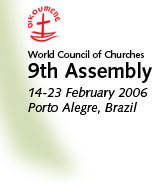 |
WCC > Home > News & media > News | ||||
| About the assembly | Programme | Theme & issues | News & media | |||||
 |
|
||||
|
10.02.05
WCC embarks on a major shift in its organizational culture and ethosReaching decisions by consensus, a major shift in the culture and ethos of the World Council of Churches (WCC), will be at the centre of the upcoming meeting of its Central Committee, which will take place 15-22 February in Geneva.
At this meeting, the last one of its mandate, the Central Committee members will try for the first time to reach decisions by consensus, for which they will test a new set of consensus procedures. They will also consider a number of changes in the WCC constitution and rules that are necessary to make consensus the established method of decision-making.
Main highlights on the Central Committee agenda are:
WCCninthAssembly -Committee members will take decisions that will give its definitive shape to this major event, to be held in Porto Alegre, Brazil, in February 2006.
Pacific region - The situation of the peoples of the region as well as the churches and ecumenical bodies' witness in its midst will be the subject of a plenary session.
Contemporary ethical challenges - Committee members will share and discuss what the WCC has done to facilitate the churches' discussion on the issue of Human sexuality since the Harare assembly (1998).
Taking place under the overall thematic umbrella of "Healing and Reconciliation", the meeting will discuss the reports of the Central Committee moderator Catholicos Aram I and WCC general secretary Rev. Dr Samuel Kobia.
Also on the agenda will be: review of the current debate about the search for a new configuration of the ecumenical movement; WCC relations with the Roman Catholic Church; and a major evaluation of the programmatic work of the Council to be presented to the next assembly.
In addition, the committee will deliberate on and possibly issue statements and minutes on the following international issues: loss of indigenous languages, Iraq, uprooted people, and the International Criminal Court.
The 150-member WCC central committee serves as the Council's chief governing body between its assemblies. Meeting every 12 to 18 months, it is responsible for carrying out policies adopted by the assembly, reviewing and supervising WCC programmes and adopting the Council's budget.
The agenda of the meeting is available at: www.wcc-coe.org/wcc/press_corner/cc2005draftagenda.html
|
|||
|
|
|

